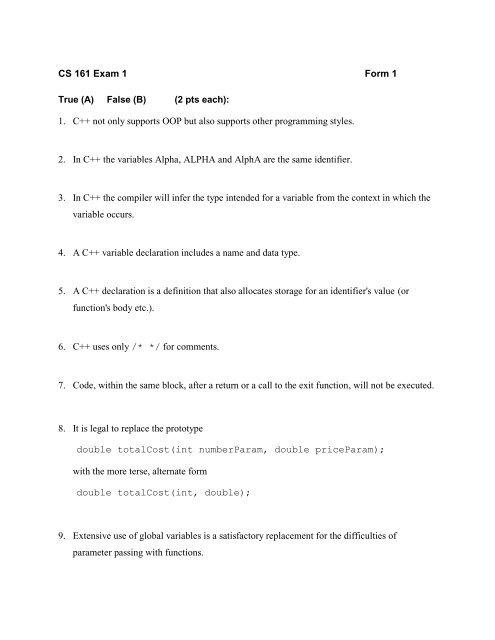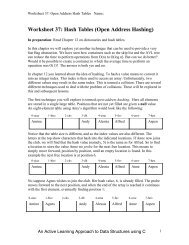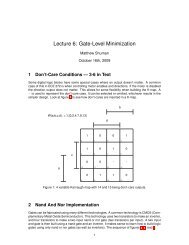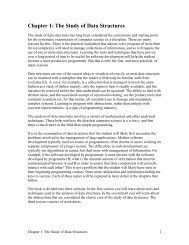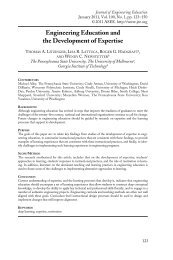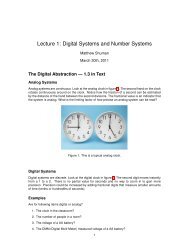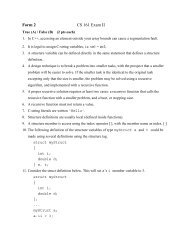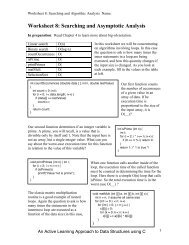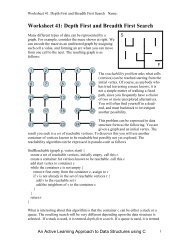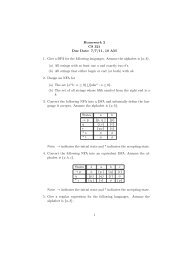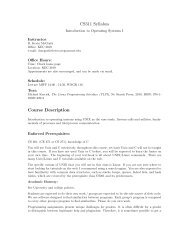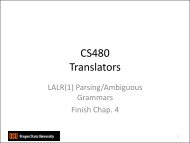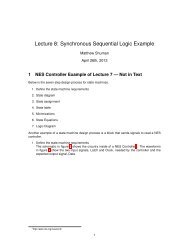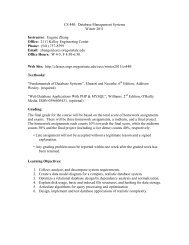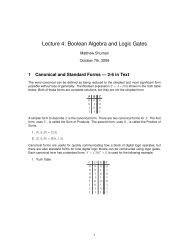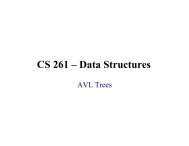Exam I - Form 1 - Classes
Exam I - Form 1 - Classes
Exam I - Form 1 - Classes
You also want an ePaper? Increase the reach of your titles
YUMPU automatically turns print PDFs into web optimized ePapers that Google loves.
CS 161 <strong>Exam</strong> 1 <strong>Form</strong> 1<br />
True (A) False (B) (2 pts each):<br />
1. C++ not only supports OOP but also supports other programming styles.<br />
2. In C++ the variables Alpha, ALPHA and AlphA are the same identifier.<br />
3. In C++ the compiler will infer the type intended for a variable from the context in which the<br />
variable occurs.<br />
4. A C++ variable declaration includes a name and data type.<br />
5. A C++ declaration is a definition that also allocates storage for an identifier's value (or<br />
function's body etc.).<br />
6. C++ uses only /* */ for comments.<br />
7. Code, within the same block, after a return or a call to the exit function, will not be executed.<br />
8. It is legal to replace the prototype<br />
double totalCost(int numberParam, double priceParam);<br />
with the more terse, alternate form<br />
double totalCost(int, double);<br />
9. Extensive use of global variables is a satisfactory replacement for the difficulties of<br />
parameter passing with functions.
10. A variable declared outside any function is said to be a local variable.<br />
11. Consider two blocks, one within another. If an identifier is declared as a variable in the<br />
inmost of these two blocks, one can access this variable from the outer block.<br />
12. Given the declaration<br />
int x = 0;<br />
The following expression causes a divide by zero error:<br />
(x == 0) || (2/x < 1);<br />
13. In a while loop, the boolean expression is executed before each execution of the loop body.<br />
14. A break statement is used in loops only.<br />
15. When a loop is nested inside another loop, a break terminates the outermost loop of the<br />
nested loop structure.<br />
16. Curly braces are required around a single statement contained in a control structure.<br />
17. The range of values for an unsigned int variable is from about -4 billion to +4 billion.<br />
Multiple Choice (3 pts each):<br />
18. In C++, which of the following is a legal identifier?<br />
a) 9xyz<br />
b) @Xyz<br />
c) X+yz<br />
d) xy_z<br />
e) a and d
19. Pick the word that is not a C++ keyword out of the following list.<br />
a) while<br />
b) boolean<br />
c) double<br />
d) if<br />
e) none of the above<br />
20. Which of the following types is not built into the C++ language:<br />
a) bool<br />
b) real<br />
c) short<br />
d) long<br />
e) double<br />
21. An l-value is<br />
a) an expression that can be only be placed on the left of any operator such as +, * , /, etc.<br />
b) assigned a value<br />
c) can never have a value fetched from it<br />
d) is designed for use by a left-handed person<br />
22. The value of the expression 20.0 * (9/5) + 32.0 is<br />
a) 68.0<br />
b) 52.0<br />
c) incorrect expression so there is no value<br />
d) 32.0<br />
e) incorrect expression , the / should be %
23. A call to a C++ function is<br />
a) The name of the function followed by empty parentheses.<br />
b) The name of the function followed by any number of arguments, regardless of the<br />
number of parameters in the definition.<br />
c) The name of the function followed by a number of arguments not greater than the number<br />
of parameters in the definition.<br />
d) The name of the function only.<br />
e) none of the above<br />
24. A void function<br />
a) performs some action and returns a value<br />
b) performs some action but does not return a value<br />
c) is a statement<br />
d) call is written much like a call to a value returning function but is terminated with a<br />
semicolon.<br />
e) may return a value but is not required to have one.<br />
25. A definition of a variable outside any function is called a<br />
a) local function definition<br />
b) global variable definition<br />
c) global function header<br />
d) global function definition<br />
e) local variable definition<br />
26. Where can you not declare a variable in a C++ program?<br />
a) Within the parameter list of a function definition<br />
b) Within the block of a void function.<br />
c) Within the argument list of a function call<br />
d) Within a block nested within another block<br />
e) Within the block of a value returning function.
27. Assume this code fragment is embedded in an otherwise correct and complete program. What<br />
should be the output from this code segment?<br />
{<br />
for( int i = 0; i < 10; i++)<br />
{<br />
. . .<br />
}<br />
cout
29. Given the following include directive (to get the declaration for the pow function from the<br />
math library):<br />
#include <br />
Now make these declarations:<br />
double base = 2, exponent = 3, power = 4;<br />
Which of the following are syntactically correct invocations for the pow function?<br />
a) power = pow(base, exponent);<br />
b) pow(power, base, exponent);<br />
c) pow(base, exponent) = power;<br />
d) base = pow(exponent, power);<br />
e) both a and d<br />
30. Which control construct repeats a sequence of statements zero or more times?<br />
a) while statement<br />
b) do-while statement<br />
c) switch statement<br />
d) if-else statement<br />
e) none of the above<br />
31. Which of the following is not true of the || operator?<br />
a) It has two operands.<br />
b) It can have one operand.<br />
c) It is the logical OR operator.<br />
d) It returns true if either operands is true.<br />
e) It uses short circuit evaluation.
32. In a switch statement, when a break statement is encountered, an immediate transfer of<br />
control is made to<br />
a) the default case of the switch statement<br />
b) a goto statement<br />
c) the else clause<br />
d) the statement beyond the end of the switch statement.<br />
e) none of these<br />
33. In distinguishing an expression as true or false, C++ sees which of the following as<br />
true?<br />
a) true<br />
b) The character 'F'<br />
c) 1<br />
d) Any non-zero value<br />
e) all of the above<br />
34. Which of the following determines the operator that is processed prior to another operator?<br />
a) Operator precedence<br />
b) Whether the operator is an arithmetic operator<br />
c) None of these determine the order in which operators are processed.<br />
d) none of the above<br />
e) all of the above<br />
35. Which of the following loop statements is guaranteed to iterate the body of the loop at least<br />
once?<br />
a) while(control) body;<br />
b) do body while(control);<br />
c) for (initialize; test; update) body;<br />
d) none of the above
36. If this code fragment were executed in an otherwise correct and complete program, what<br />
would the output be?<br />
int a = 3, b = 2, c = 5<br />
if (a > b)<br />
a = 4;<br />
if ( b > c)<br />
a = 5;<br />
else<br />
a = 6;<br />
cout
38. Given the function, and the main function calling it: What is the output of the following<br />
code if you omit the ampersand (&) from the first parameter, but not from the second<br />
parameter? (You are to assume this code is embedded in a correct function that calls it.):<br />
#include <br />
using namespace std;<br />
void func(int & x, int & y)<br />
{<br />
int t = x;<br />
x = y;<br />
y = t;<br />
}<br />
int main()<br />
{<br />
int u = 3; v = 4;<br />
// ...<br />
cout
39. The statements int x = 1; int y; y = (++x)++;<br />
a) Assign y the value 2;<br />
b) Change the value of x to 2.<br />
c) Assign y the value 0;<br />
d) Assign y the value 1;<br />
e) none of the above.<br />
Extra Credit (5 pts each):<br />
Write a function definition called even that takes one argument of type int and returns a bool<br />
value. The function returns true if one argument is an even number; otherwise it returns<br />
false.<br />
Write a function definition for a isDigit function that takes one argument of type char and<br />
returns a bool value. The function returns true if the argument is a decimal digit; otherwise it<br />
returns false.


